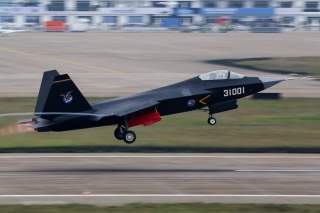Lengthening Chinese Airstrips May Pave Way for South China Sea ADIZ
First the Great Wall, then the Grand Canal, and now the Great Wall of Sand.
While willfully ignoring such reasonable points, however, Beijing’s propaganda organs continually complain about a “China Threat Theory” because foreigners do not accept unquestioningly that China’s intentions are always peaceful. State media appears tone deaf, publishing op-eds with titles like, “Is Obama really ‘concerned’ or stirring concern” and deriding his “funny theory about China being a bully in the SCS.” Such a “theory” is hardly discredited when a Xinhua writer declares in China Daily, “It is in the best interests of all parties involved in the SCS issue to find a peaceful solution on their own, instead of being dictated to by an outside power that could easily escape unscathed….” A headline stock phrase: “Washington’s trick of ‘thief crying stop thief’ on SCS.”
And these are the English-language pieces intended to win foreign hearts and minds—you should see some of the Chinese-language ones if you haven’t already! Constant subjection to boilerplate like this may be one reason why many Western China analysts are perceived to be taking a harder, more skeptical line toward Beijing of late. One can only imagine how their Chinese counterparts would react if official U.S. venues began constantly blasting such one-sided vitriol while repressing dissenting voices. One thing’s for sure: Chinese mouthpieces would undoubtedly trot out another threadbare meme and describe it as “offending the feelings of 1.3 billion Chinese people.”
China “is not necessarily abiding by international law and is using its sheer size and muscle to force countries into subordinate positions,” President Obama stated on April 9. “Just because the Philippines or Vietnam are not as large as China doesn’t mean that they can just be elbowed aside.”
But they can be, increasingly, if Washington doesn’t find better ways to cooperate with its allies and partners in the region; maintain a robust, effective presence there; and impose actual costs for Chinese behaviors that it opposes. Otherwise, U.S. policy will be perceived as adrift in an increasingly stormy sea. And the kind of world most people want to see will increasingly be replaced by one in which money and might even more make right, with even fewer restraints for the strong, and even less recourse for the weak.
Dr. Andrew S. Erickson is an Associate Professor in the Strategic Research Department at the U.S. Naval War College (NWC) and a core founding member of the department’s China Maritime Studies Institute (CMSI). He serves on the Naval War College Review’s Editorial Board. Since 2008, he has been an Associate in Research at Harvard University’s John King Fairbank Center for Chinese Studies. Erickson is also an expert contributor to the Wall Street Journal’s China Real Time Report. This piece first appeared on Dr. Erickson's website here. The views expressed here are those of the author alone. They do not represent the policies or estimates of the U.S. Navy or any other organization of the U.S. government.
Image: Wikimedia.

